Fonte Surname Ancestry ResultsOur indexes 1000-1999 include entries for the spelling 'fonte'. In the period you have requested, we have the following 45 records (displaying 11 to 20): Single Surname Subscription | | | Buying all 45 results of this search individually would cost £202.00. But you can have free access to all 45 records for a year, to view, to save and print, for £100. Save £102.00. More... |
These sample scans are from the original record. You will get scans of the full pages or articles where the surname you searched for has been found. Your web browser may prevent the sample windows from opening; in this case please change your browser settings to allow pop-up windows from this site. Courtroll of the manor of Ruislip, Middlesex
(1248)
King's College, Cambridge, has a series of courtrolls relating to the English possessions of the Norman abbey of Bec. The earliest of these (C 1), a single membrane, contains the records of manorial courts from Hockday term 1246, Martinmas term 1247 (though extending through to the following Lammas), and 1249. F. W. Maitland selected pleas from this roll, transcribed them into extended Latin, with an English translation facing, and they were published in 1889 by the Selden Society. Maitland's translation anglicizes or modernizes the surnames, so we have confined our index to the Latin; but that is not without its difficulties, because the 13th-century clerk often latinizes what would have been indigenous English surnames (such as 'de Arbore' for Tree or Attree). This court was held 4 and 8 February 1248.FONTE. Cost: £4.00.  | Sample scan, click to enlarge
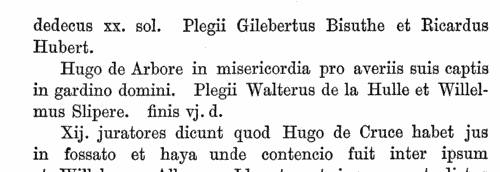
| Northamptonshire Charters
(1240-1249)
A large accumulation of documents preserved in the Bodleian Library, Oxford, formerly constituted the antiquarian collections of Anthony a Wood, Roger Dodsworth, Ralph Thoresby, Thomas Martin of Palgrave, Thomas Tanner bishop of St Asaph, Dr Richard Rawlinson, Richard Furney archdeacon of Surrey, and Richard Gough. A calendar of these was prepared by William H. Turner and published in 1878 under the title 'Calendar of Charters and Rolls preserved in the Bodleian Library'. The word 'charters' is here used in a rather loose sense, including virtually any manuscript or copy of a manuscript, but the bulk of the contents consists of mediaeval deeds of conveyance. Turner's calendar deals with each briefly, naming the principal parties and the nature of the deed, but hardly ever lists the witnesses. Many of these charters were undated (dating of deeds did not become general until around 1350) or so damaged or defective ('mutilated' is Turner's usual description) as no longer to display a legible date. However, he contrived, from the style of the script and/or the nature of the contents, to estimate dates in such cases. The sample scan is from the start of the Bedfordshire list. FONTE. Cost: £4.00.  | Sample scan, click to enlarge
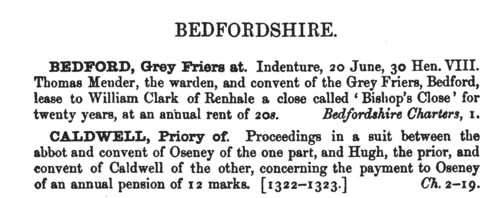
| Clerks and Clergy in Yorkshire, Nottinghamshire, and parts of Lancashire, Westmorland, and Northumberland
(1215-1255)
The register of archbishop Walter Gray of York, containing general diocesan business, mostly relating to clergy. The diocese of York at this period covered all of Yorkshire and Nottinghamshire, as well as Lancashire north of the Ribble, southern Westmorland, and Hexhamshire in Northumberland. The register survives as two rolls (called the Major and the Minor), in all amounting to nearly 71 feet of parchment. It is thought that a third roll or more has been lost, because the acts of the archbishop for the last ten years of his episcopate are missing, as are all the ordination and ecclesiastical discipline records for his reign. The then unpublished parts of the register were edited for the Surtees Society by James Raine and printed in 1870, with some additional material included in appendices.FONTE. Cost: £4.00.  | Sample scan, click to enlarge

| Fine Rolls
(1246-1272)
The fine rolls of the 31st to 57th years of the reign of king Henry III record part of the government administration in England. These excerpts from the rolls list in transcript applications by plaintiffs for various writs (such as 'ad terminum' and 'pone') and for assizes to be held by the justices in eyre to look into their grievances. A fine of half a mark (6s 8d) or a mark (13s 4d) was usually levied; the cases are normally identified by county, and record that the appropriate sheriff had been notified. There are also more extensive records, in which more detail is given. The excerpts were made by the Record Commission and printed in 1836.FONTE. Cost: £4.00.  | Sample scan, click to enlarge

| Courtroll of the manor of Swincombe, Oxfordshire
(1276)
King's College, Cambridge, has a series of courtrolls relating to the English possessions of the Norman abbey of Bec. C 6, a single membrane, contains the records of manorial courts from October 1275 to June 1276. F. W. Maitland selected pleas from this roll, transcribed them into extended Latin, with an English translation facing, and they were published in 1889 by the Selden Society. Maitland's translation anglicizes or modernizes the surnames, so we have confined our index to the Latin; but that is not without its difficulties, because the 13th-century clerk often latinizes what would have been indigenous English surnames (such as 'de Cimiterio' for Churchyard). This court was held 30 April 1276.FONTE. Cost: £4.00.  | Sample scan, click to enlarge
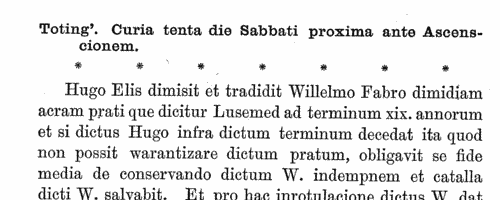
| Patent Rolls: entries for the English possessions in France
(1276-1277)
Calendars of the patent rolls of the reign of king Edward I are printed in the Calendars of State Papers: but these cover only a fraction of the material on the rolls. From 1881 to 1889 the reports of the Deputy Keeper of the Public Record Office also include calendars of other material from the rolls - about five times as many entries as in the State Papers - predominantly mandates to the royal justices to hold sessions of oyer and terminer to resolve cases arising locally; but also other general business. The calendar for the 5th year of king Edward I [20 November 1276 to 19 November 1277], hitherto unindexed, is covered here.FONTE. Cost: £6.00.  | Sample scan, click to enlarge
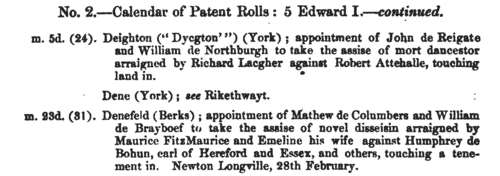
| Patent Rolls: entries for Kent
(1278-1279)
Calendars of the patent rolls of the reign of king Edward I are printed in the Calendars of State Papers: but these cover only a fraction of the material on the rolls. From 1881 to 1889 the reports of the Deputy Keeper of the Public Record Office also include calendars of other material from the rolls - about five times as many entries as in the State Papers - predominantly mandates to the royal justices to hold sessions of oyer and terminer to resolve cases arising locally; but also other general business. The calendar for the 7th year of king Edward I [20 November 1278 to 19 November 1279], hitherto unindexed, is covered here.FONTE. Cost: £6.00.  | Sample scan, click to enlarge
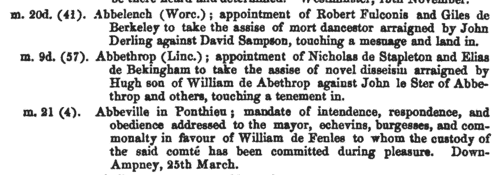
| Grantees of offices, commissions and pardons
(1272-1281)
The Patent Rolls are the Chancery enrolments of royal letters patent. Those for the 1st to the 9th years of the reign of king Edward I (29 November 1272 to 17 November 1281) were edited for the Public Record Office by J. G. Black, and published in 1901. The main contents are royal commissions and grants; ratifications of ecclesiastical estates; writs of aid to royal servants and purveyors; and pardons. FONTE. Cost: £2.00.  | Sample scan, click to enlarge

| Courtroll of the manor of Ruislip, Middlesex
(1281)
King's College, Cambridge, has a series of courtrolls relating to the English possessions of the Norman abbey of Bec. C 8, a single membrane, contains the records of manorial courts from November 1280 to May 1281. F. W. Maitland selected pleas from this roll, transcribed them into extended Latin, with an English translation facing, and they were published in 1889 by the Selden Society. Maitland's translation anglicizes or modernizes the surnames, so we have confined our index to the Latin; but that is not without its difficulties, because the 13th-century clerk often latinizes what would have been indigenous English surnames (such as 'de Cimiterio' for Churchyard). This court was held 26 April 1281.FONTE. Cost: £4.00.  | Sample scan, click to enlarge
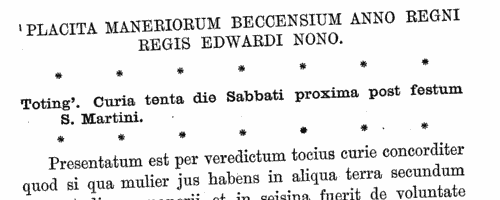
| Yorkshire Inquisitions
(1241-1283)
Inquisitions post mortem are inquiries as to the real estate and heir of each person holding in capite or in chief, i. e. directly, from the Crown, or whose estates had been escheated or were in ward. The age and relationship of the heir are usually recorded. Inquisitions ad quod damnum enquired as to any activities (including maladministration by local officials) that had resulted in any material loss to the Crown. Both sets of inquisitions for this period were edited by William Brown for the Yorkshire Archaeological and Topographical Association, and printed in 1891. This index covers all names mentioned, including jurors, tenants, &c. FONTE. Cost: £4.00.  | Sample scan, click to enlarge
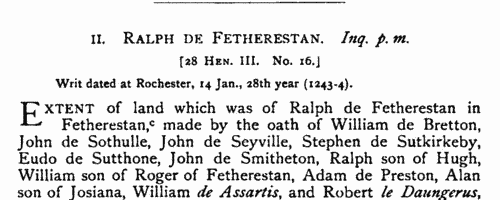
|
Research your ancestry, family history, genealogy and one-name study by direct access to original records and archives indexed by surname.
|












